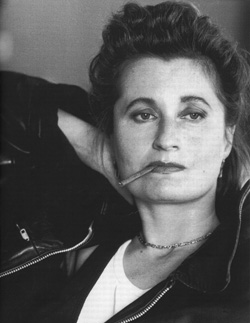| Elfriede Jelinek  Born: 20-Oct-1946 Born: 20-Oct-1946
Birthplace: Mürzzuschlag, Styria, Austria
Gender: Female
Religion: Jewish
Race or Ethnicity: White
Sexual orientation: Straight
Occupation: Novelist, Playwright Nationality: Austria
Executive summary: Die Klavierspielerin Elfriede Jelinek is an Austrian novelist and playwright who came to international awareness when she was awarded the 2004 Nobel Prize for Literature. Jelinek's works frequently explicate relationships of domination and the distasteful hidden truths that underlay both personal relationships and society as a whole. She is famed for both her chilling frankness and her powerful, innovative use of language. Her better known works include Die Liebhaberinnen (Women as Lovers), Die Ausgesperrten (Wonderful, Wonderful Times), Die Klavierspielerin (The Piano Teacher), and Lust. A film version of the The Piano Teacher was released in 2001 with French actress Isabelle Huppert in the starring role. Jelinek has also adapted David Lynch's Lost Highway into an operatic libretto.
Jelinek's mother was of a wealthy Viennese family and her father was a chemist of Czech-Jewish origin. Involved in vital industrial production during the World War II, her father escaped Nazi persecution, but later died in a mental hospital (1969). Elfriede Jelinek grew up in Mürzzuschlag, attending school while also studying piano, recorder, and organ. She later studied composition at the prestigious Vienna Conservatory, and then explored theatre and art history at the University of Vienna.
Highly literate and a self-described loner in childhood, Jelinek developed an early love of writing, with poetry providing an outlet for her isolated inner reality. As an adult she found the Vienna Group, founded by H. C. Artmann, whose influence taught her to convey meaning not merely through the content (that is, the plot and dialogue, etc.), but also through the language itself, using sound and structure much to influence perception. Additionally, Jelinek credits her training as a musician and composer in the development of her particular style.
Another obvious source of influence was her political involvement in the student movement and, later, the Communist Party. The resultant political sensibilities, coupled with her own experiences growing up, generated her now legendary emphasis on social repression, sadism, and other relations of power. Her first publication, Lisas Schatten (1967), was a collection of poetry, and was followed just a few years later by her rebellious and satirical novel wir sind lockvögel baby! (1970). Significant works since then, in addition to those already mentioned, include Totenauberg (1991) and Ein Sportstück (1998), as well as the plays, Bambiland and Babel which deal with the Iraq war.
While Jelinek's social and political views have earned her strident criticism and enmity, especially within her native Austria, her literary accomplishments have earned her a number of recognitions. Among these are the Heinrich Böll Prize (1986) for her contribution to the German literature, the prestigious the Büchner Prize (1998), the Berlin Theatre Prize (2002), the Mülheimer Theatre Prize (2002, 2004), and the Lessing Critics' Prize, Wolfenbüttel (2004). Her 2004 Nobel Prize was awarded her "for her musical flow of voices and counter-voices in novels and plays that with extraordinary linguistic zeal reveal the absurdity of society's clichés and their subjugating power." Although Jelinek did accept the Nobel Prize, she did not attend the ceremony, citing extreme "social phobia".
Photo copyright ©Karin Rocholl, used with kind permission. Father: (chemist, d. 1969)
Husband: Gottfried Hüngsberg (m. 1970s)
Conservatory: Vienna Conservatory
University: University of Vienna
Nobel Prize for Literature 2004
Georg Büchner Prize 1998
Communist Party of Austria (1974-91)
Risk Factors: Agoraphobia
Author of books:
Bukolit. Hörroman (1979, novel)
Wir sind Lockvögel baby! (1970, novel)
Michael: Ein Jugendbuch für die Infantilgesellschaft (1972, novel)
Die Liebhaberinnen (1975, novel)
Die Ausgesperrten (1980, novel)
Die Klavierspielerin (1983, novel)
Oh Wildnis, oh Schutz vor ihr (1985, novel)
Lust (1989, novel)
Die Kinder der Toten (1997, novel)
Gier (2000, novel)
Requires Flash 7+ and Javascript.
Do you know something we don't?
Submit a correction or make a comment about this profile
Copyright ©2019 Soylent Communications
|